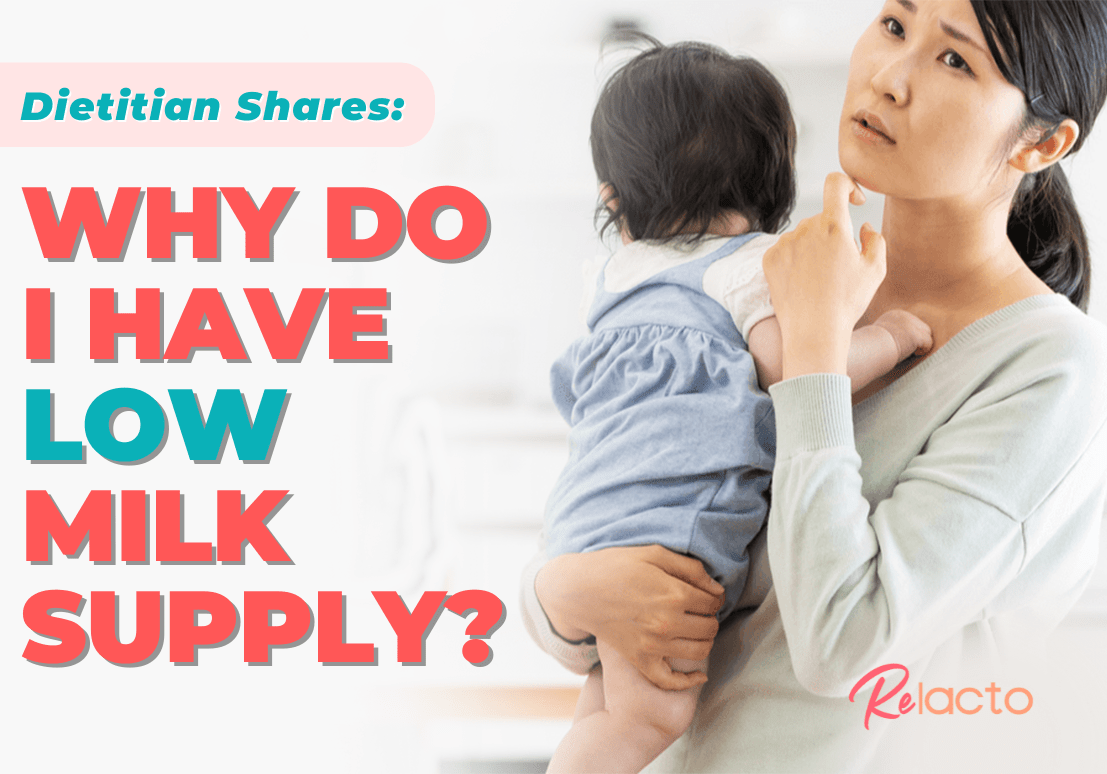Dietitian Shares: Why Do I Have Low Milk Supply?

We’ve been encouraged to eat well time and time again in hopes to boost breast milk.
We are always searching for the next best foods to increase breast milk. So when mothers notice a decrease in their milk supply, it’s natural and very common to think that food is the main culprit.
However, did you know, to date, it hasn’t been scientifically proven that food is the main and sole reason for lower milk supply. Instead, studies have shown that decreasing milk supply is more highly related to a combination of other non-food related reasons. Here are some factors to consider about.
Slower Onset of Milk Production and Mentally Stressed or Anxious Mothers
A slower onset of milk production may be due to disruption of early breastfeeding after giving birth. They will likely find it very difficult to establish their milk supply during the early days following childbirth. This may cause anxiety and feeling of inadequacy in mothers which interferes with letdown ( limiting flow of colostrum). Other than that, mothers may feel the need to supplement the baby with formula milk to compensate for the lack in breast milk production which then further limits milk supply due to less stimulation and emptying of the breast, a vicious negative cycle. Left helpless, mothers would subsequently decrease in confidence to continue breastfeeding, thus stopping breastfeeding and transitioning to formula feeds much sooner.
Acute Illness & Infection
Sometimes, it is inevitable and mothers may fall ill. Milk supply may temporarily decrease but production should rebound after initial exposure. In other instances where medication needs to be taken for a longer period to treat and manage symptoms of a medical condition, the rebound may not happen. So, if you find that your supply dipped and does not return to normal as you are taking your medications, do contact your doctor! It’s important to get it checked with your doctor. Do discuss with them other alternative medications that you could take that are safe for you and your baby and that will not affect milk supply.
Incomplete Milk Removal & Ineffective suckling
In normal situations, heavier babies stimulate larger volumes of milk production than smaller babies as milk supply is infant driven; demand and supply. In some situations, the milk is not completely removed. Some of the possible factors are infrequent feeding or expressed milk, or insufficient length of time for latching or pump expression. Occasionally, some infants may struggle to remove milk effectively from the breast due to positioning of latching or abnormality in suckling is present. On the opposite side of the spectrum, the rate and pattern of suckling is dependent on milk flow. Thus, ineffective suckling can result in lower milk flow and incomplete emptying of the breast vice versa. This may result in lesser milk supply.
Smoking
Maternal smoking has been shown to be detrimental to milk ejection, milk volumes, infant weight gain and total duration of breastfeeding. Second hand smoking is also associated with shorter duration of breastfeeding.
Maternal Stress

Labour and childbirth are two very stressful events. The first month after birth is probably the most difficult period as your body would still be recuperating from childbirth. You may also be possibly experiencing sleep deprivation too as you try to continue to provide breast milk to your infant. The physical, emotional and social stress during this period are expected but should not interfere with your breastfeeding journey.! Moderate to severe stress has been reported to inhibit oxytocin which is the hormone that influences milk production by the body. Despite that, there are times that some mothers are still able to successfully breastfeed their infants, as we know many who had during World War 2. Thus, it is very important for mothers to surround themselves with a supportive community and seek out external help whenever they may feel overwhelmed.
Maternal Mental Health
The relationship between postpartum depression and breastfeeding is very complex. Although breastfeeding is associated with lower risk of postpartum depression when a mother intends to breastfeed, and not breastfeeding is associated with increased risk of postpartum depression in mothers who intended to breastfeed, breastfeeding is associated with increased risk of postpartum depression in mothers who did not intend to breastfeed. This study is very significant as it reflects that lactation support should be individualized to mother’s goals.
Therefore, the combination of food and non-food related factors should be considered in order to support mothers to breastfeed optimally. Seek help from your doctor, lactation nurses or consultants if there are other non-food related issues impacting your experience in breastfeeding.
As for food related factors which mothers can take control of, do plan to adequately nourish yourself as you breastfeed so that you can keep yourself healthy as you provide the best for your baby. If you do not plan and are not intentional with your meals, you may easily find yourself prioritizing the cheapest and most convenient foods to eat when you are hungry and tired instead of the most balanced meals. Nowadays, there is lactation food catering service in Singapore that can be helpful in your meal plan during the period after confinement.







